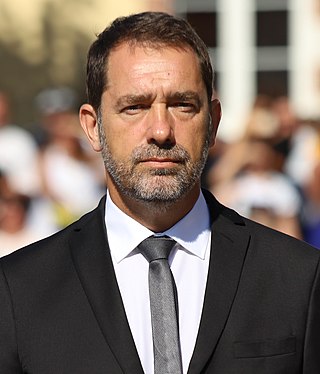The Organization of Young Free Algerians was a pro-government armed group that claimed credit for various attacks against civilians who sympathised with the Islamists during the Algerian Civil War. It was active mainly in 1994 and 1995. However, it was a front under which elements of the DRS, the Algerian security services, operated. OJAL never existed as an independent organisation.
Events in the year 2016 in Belgium.

Khālid El Bakraoui, also known as Abū Walīd al-Baljīkī, was a Belgian national of Moroccan descent, confirmed to be the suicide bomber at the metro station in the 2016 Brussels bombings.
The Sid Ahmed Ghlam case concerns the April 2015 murder of Aurélie Châtelain and planning of an Islamic terrorist attack against a church in Villejuif, France, by an Algerian national, Sid Ahmed Ghlam. In November 2020, he was sentenced to life in prison by a Paris court. This sentence was upheld on appeal in October 2021.

Islamic terrorism has been carried out in Europe by the jihadist groups Islamic State (ISIL) or Al-Qaeda as well as Islamist lone wolves since the late 20th century. Europol, which releases the annual EU Terrorism Situation and Trend report (TE-SAT), used the term "Islamist terrorism" in reports for the years 2006–2010, "religiously inspired terrorism" for the years 2011–2014, and has used "jihadist terrorism" since then. Europol defines jihadism as "a violent ideology exploiting traditional Islamic concepts".
Farid Melouk is a French-Algerian former member of the Armed Islamic Group (GIA) and convicted terrorist, known for his central role in jihadist networks.
On 5 October 2016, three police officers were attacked by a man wielding a machete in the Schaerbeek municipality of Brussels, Belgium. Two of them suffered stab wounds, while the third was physically assaulted but otherwise uninjured. The suspected assailant, a Belgian citizen named Hicham Diop, was apprehended and charged with attempted terrorism-related murder and participating in a terrorist group.

Opération Sentinelle is an ongoing French military operation with 10,000 soldiers and 4,700 police and gendarmes deployed since the aftermath of the January 2015 Île-de-France attacks, with the objective of protecting the deemed sensitive "points" of the territory from terrorism. It was reinforced during the November 2015 Paris attacks, and is part of a state of emergency in France due to continued terror threats and attacks, until the state of emergency ended on 1 November 2017. On 13 October 2023, France raised its security alert to the highest level, and the day after it deployed 7,000 soldiers following the Arras school stabbing.

ISIL-related terrorist attacks in France refers to the terrorist activity of the Islamic State in France, including attacks committed by Islamic State-inspired lone wolves. The French military operation Opération Sentinelle has been ongoing in France since the January 2015 Île-de-France attacks.

Christophe Castaner is a French politician who served as Minister of the Interior from 16 October 2018 to 6 July 2020 under President Emmanuel Macron. He had been elected in 2017 for a three-year term as chairman of the La République En Marche! party with Macron's support. Castaner was Government Spokesperson under Prime Minister Édouard Philippe in 2017 and Secretary of State for Relations with Parliament from 2017 to 2018. He was also Macron's 2017 presidential campaign spokesman.
This article covers attacks and activity of terrorism in Belgium.

On 20 June 2017, a terrorist bomb caused a small explosion at Brussels-Central railway station in Brussels, Belgium; there were no casualties. Soldiers patrolling the station subsequently killed the suspect with three to four shots, according to eyewitnesses. The perpetrator was Oussama Zariouh, a 36-year-old Moroccan national who lived in the Molenbeek municipality and who had assembled a defective explosive device.
On 25 August 2017, a stabbing occurred near the Grand-Place/Grote Markt in Brussels, Belgium, when two soldiers were injured by an assailant wielding a knife.

On 29 May 2018, Benjamin Herman, a prisoner on temporary leave from prison, stabbed two female police officers, took their guns, shot and killed them and a civilian in Liège, Belgium. The gunman took a woman hostage before he was killed by police. The attacker had since 2017 been suspected of having been radicalised in prison after converting to Islam, and was reported to be part of the entourage of a prison Islamist recruiter. The method of the attack was said by investigators to match and be specifically encouraged by the Islamic State which claimed the attack. Prosecutors say they are treating the attacks as "terrorist murder". The attack is treated as "jihadist terrorism" by Europol.
The 2018 Brussels stabbing attack occurred on 20 November 2018 when a man wielding two knives attacked police officers outside a police station adjacent to the Grand-Place/Grote Markt in Brussels, Belgium. A police officer was wounded and the attacker was shot and injured by the police. Both the attacker and a wounded officer were hospitalized with non life-threatening injuries. An investigation for possible links to terrorism is underway. Jan Jambon, Belgium's Minister of the Interior and Security, said the suspect had been interned and recently freed.

UCLouvain Charleroi is a campus of the University of Louvain in Charleroi, Belgium. Consisting of 3 faculties and a series of research centers and institutes, UCLouvain Charleroi consists of the Maison Georges Lemaître, in the center of the city, and a branch in Montignies-sur-Sambre.

On 3 October 2019, a police employee at the Paris police headquarters stabbed four of his colleagues to death and injured two others. He was shot dead by police at the scene.
Events in the year 2022 in Belgium.

The 2020 Villejuif stabbing was a mass stabbing that took place in the Hautes-Bruyères area of Villejuif on 3 January 2020. The perpetrator, Nathan Chiasson, killed one and left two people injured before being shot and killed by French authorities.

The following is a timeline of the history of Brussels, Belgium, in the 21st century.












